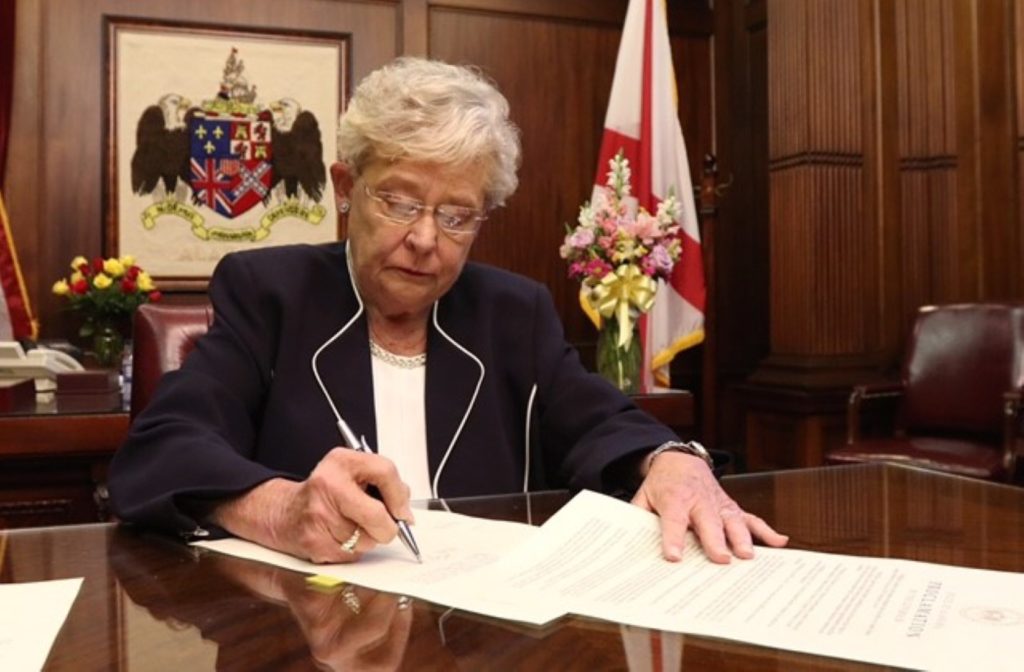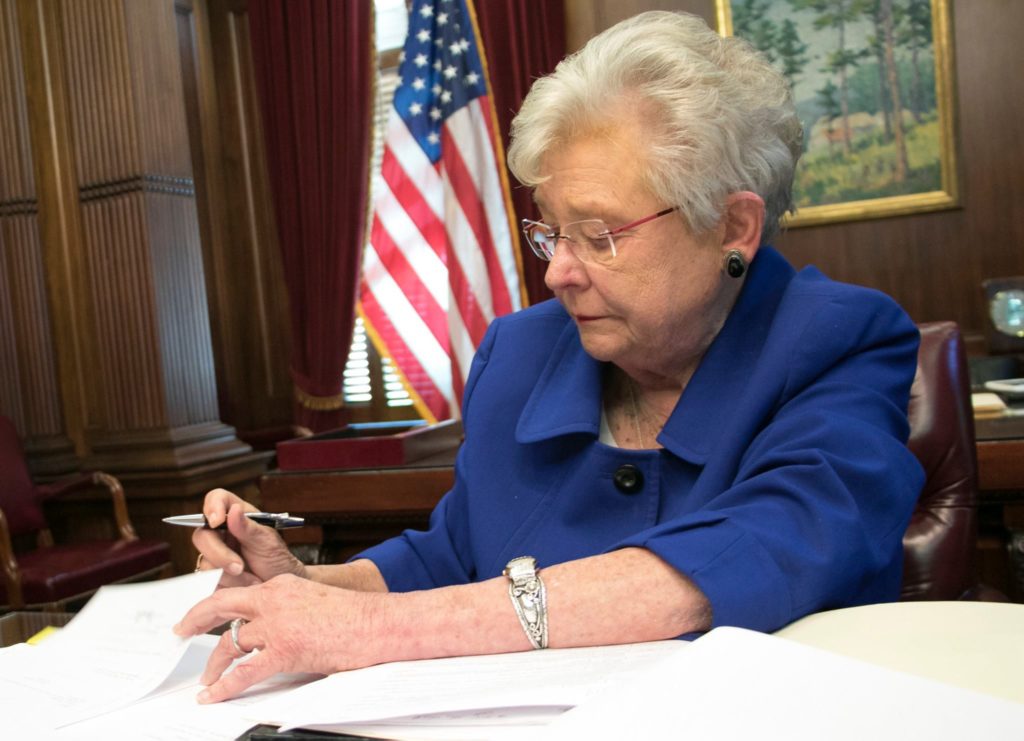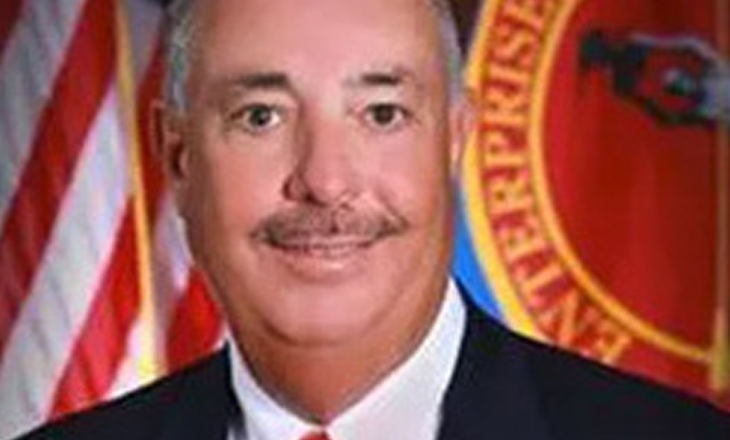Kay Ivey awards over $6.3 million in Community Development Block Grants

On Wednesday, Gov. Kay Ivey presented over $6.3 million in Community Development Block Grants to improve the communities of 26 Alabama cities, towns and counties. These grants are allocated annually through a competitive process based on many components including: the community’s need, cost efficiency of projects and number of low- and moderate-income families affected. “Lives will be improved today thanks to these projects funded through the Community Development Block Grant program,” insisted Ivey. “People who have been subject to impure water will get clean water to drink, bathe and wash. People who have been maneuvering unsafe roads will soon be traveling smooth streets and the list goes on. I am so thankful for this program and the assistance it provides to communities who may be unable to afford these needed improvements on their own.” A ceremony at the Capitol announced the first wave of CDBG grants, Ivey plans to reveal another series of the same grants on February 1. The grants are made possible through funds from the U.S. Department of Housing and Urban Development. The Alabama Department of Economic and Community Affairs (ADECA) is responsible for the administration of the allowances. “As a former mayor, I am aware of how important these grants are to these communities and the impact that they have in improving the quality of life,” asserted Director of ADECA, Kenneth Boswell. “I join with Gov. Ivey in congratulating the towns, cities and counties that have been awarded grants. Those involved in this process are to be commended for their dedication and hard work they have provided for their communities.” The funds are in several categories of aid including: community enhancement, county, planning and Black Belt. The Community Development Block Grants awarded, their amounts, and the projects they will fund are as follows: Planning Town of Ragland – $28,000 for downtown revitalization plan. Black Belt Town of Pine Hill – $350,000 for water improvements. County Choctaw County Commission – $350,000 for street improvements. Clarke County Commission – $350,000 for street improvements. Coosa County Commission – $350,000 for street improvements. Covington County Commission – $350,000 for water extension. DeKalb County Commission – $256,422 for streets and drainage. Geneva County Commission– $350,000 for water extension. Jackson County Commission – $275,780 for water extension. Lamar County Commission – $222,000 for water extension. St. Clair County Commission – $350,000 for street improvements. Community Enhancement City of Aliceville – $206,272 for fire truck for Volunteer Fire Department. Town of Ariton – $249,976 for street improvements. City of Ashford – $146,807 for street improvements. Town of Chatom – $150,000 for street improvements. City of Evergreen – $250,000 for a baseball field. Town of Louisville – $250,000 for street improvements. Town of Mosses – $149,068 for community park upgrades. City of Muscle Shoals – $250,000 for a “miracle field” ball field. City of Ozark – $250,000 for a swimming pool. City of Sheffield – $132,300 for demolition and clearance. Town of Susan Moore – $250,000 for water improvements. Town of Taylor – $205,604 for street improvements. Town of Thorsby – $250,000 for demolition and clearance. Town of Triana – $238,690 for Town Hall rehabilitation. City of Wetumpka – $171,000 for demolition and clearance.
Alabama Spaceport Authority to hold first meeting Tuesday

The Alabama Space Authority, which was established earlier this year, will hold its initial meeting Tuesday at the U.S. Space and Rocket Center in Huntsville, Ala. During the 2017 legislative session, Lineville-Republican State Sen. Gerald Dial and Madison-Republican State Rep. Howard Sanderford sponsored legislation that created the spaceport authority to promote the research and development of the aerospace and aviation industries in Alabama. Housed within the Alabama Department of Economic and Community Affair (ADECA), the space authority will seek space business opportunities, and promote activities and industries specifically related to space exploration. Glenn H. Rizner, who is Chief of Staff for the Federal Aviation Administration’s Commercial Space Transportation Office, will make a presentation at the meeting. “I have worked with Mr. Rizner and my colleagues in both the House and Senate since 2012 to create the Alabama Spaceport Authority. It has been a long process and I am excited to be a part of the foundation for the next generation of industries and jobs for our great state,” Dial said. “Look at the long-reaching impact that the Mobile ports have had on our ability to recruit industries, and how important our airports are to our ability to attract companies and tourism – now imagine what a Spaceport in Alabama will do for the next generation of Alabamians.” “We have a unique opportunity to become as relevant in the commercial space industry as we are in the automotive industry. We have proven time and time again that we have can develop the workforce necessary for any endeavor,” Dial continued. “We are not just talking about pilots and engineers, but also highly-skilled welding and fabrication jobs, sand blasting, transport and logistics as well as the support personnel that come with any industry.” “The long-term economic impact of having a Spaceport in Alabama will rival the economic effect that seaports and airports have had.”
Kay Ivey awards $3.3 million to enhance recreation in Alabama

Alabamians will soon have even more ways to enjoy the outdoors thanks to $3.3 million in grants awarded by Gov. Kay Ivey to expand recreational trails in several communities across the state. Ivey has awarded 18 grants to help improve or construct recreation venues in nine municipalities, numerous state parks, a university campus and several other trail systems throughout the state. “Outdoor trails lead to healthier minds and bodies, and they are a great investment in our state and communities,” said Ivey. “I welcome these new or improved trails, and I encourage everyone to visit one and experience the outdoors that Alabama offers.” The grants were awarded from funds made available to the state from the Federal Highway Administration’s Recreational Trails Program. The Alabama Department of Economic and Community Affairs (ADECA) administers the program in Alabama. “Gov. Ivey and I both applaud those elected officials, individuals and organizations who work so hard to improve recreation opportunities in their communities,” ADECA Director Kenneth Boswell said. “I am pleased that ADECA is a partner in this process to enhance recreation and make our communities better places to live.” The Alabama Department of Conservation and Natural Resources, which manages Alabama’s state parks, was awarded three grants totaling $564,400. A $300,000 grant will help build a nature trail for low-powered, reduced-noise motorized vehicles like golf carts, at Lakepoint State Park in Eufaula. A $64,400 grant will enable the department to build a diverse-use trail at Joe Wheeler State Park near Rogersville. The department will use a $200,000 grant to buy trail maintenance and construction equipment for the building and upkeep of trails throughout the state parks system. Below is a description of other grants, listed geographically from north to south: Limestone County Commission – $128,800 to upgrade the 10.8-mile-long Richard Martin Trail including repairing two bridges, installing two interpretive signs, controlling erosion and completing a trail assessment study. The trail extends from just north of Athens to the Tennessee state line. Athens – $200,000 for a 1,200-foot-long extension of Swan Creek Greenway, purchasing one acre and constructing a new trailhead at the newly acquired property. Decatur– $199,985 to construct an 825-foot-long, 8-foot-wide multi-use trail along Wilson Street. The trail, which will also be an extension of the Dr. Bill Sims Bike Trail, connects Rhodes Ferry Park and Ingall’s Harbor Pavilion. Cullman City Utilities Board – $193,092 to construct three trailheads along the 21-mile-long, multi-use trail at Duck River Reservoir. Cullman County Commission – $550,473 to construct a bathhouse and multiple wash stations at Stoney Lonesome Off-Highway Vehicle Park near Bremen. The 1,456-acre park, which has received previous Recreational Trail Program grants is a motorized park that accommodates small and large vehicles and has a campground. Shelby County Commission– $200,000 to construct a trailhead and a five-mile-long, multi-use trail at Cahaba River Park. Childersburg – $200,000 to expand the Kymulga Grist Mill park property with an additional 160 acres, construct seven miles of multi-use trails, install a trailhead and pave the parking area. Cahaba Medical Foundation (Centreville) – $120,000 to renovate and expand the Centreville Riverwalk and construct a scenic overlook and access for kayaks/canoes to promote increased recreation traffic along the Cahaba River. Tallapoosa County Commission – $200,000 to resurface a quarter-mile-long, multi-use track at Dadeville High School. Lanett – $41,840 to construct about a half-mile walking trail at Lanett Central Park with security lighting, signage and landscaping. Troy University (Troy) – $200,000 to build a 1,200-foot-long trail along McKinley Drive and an 800-foot-long trail along Luther Street adjacent to Janice Hawkins Cultural Arts Park. Pine Hill – $49,084 to resurface the existing walking trail and add new lights at the city park. Thomasville – $60,984 to construct a 10-foot-wide, 1,200-foot-long walking trail at Thomasville Community Playground. Mobile County Commission – $182,160 to construct a 10-foot-wide, three-quarter-mile paved multi-use trail at Chickasabogue Park. Trailside benches will be added. Orange Beach – $116,532 to construct a .65-mile trail to connect the Hugh S. Branyon Backcountry Trail to the Orange Beach Sportsplex. The connecting trail will loop around a lake and a natural area.
Kay Ivey awards $208k grant to help crime victims statewide

Gov. Kay Ivey on Thursday awarded a $208,845 grant to the Victims of Crime and Leniency (VOCAL) Angel House in Montgomery — a non-profit organization that works with families and victims of crime in Alabama who have been affected by homicide — to assist victims of violent crimes in 59 counties throughout the Yellowhammer State. “When crime unfortunately happens, it is important for professional assistance to be available to help victims move quickly toward recovery,” Ivey said. “I commend VOCAL Angel House for ensuring victims receive the help necessary to start the healing process and for advocating for victims throughout the recovery process.” The organization also assists victims of robbery and family members who have lost a loved one to homicide with filing for compensation. All services are provided free of charge to victims in the following counties: Autauga, Baldwin, Bibb, Blount, Butler, Calhoun, Chambers, Cherokee, Chilton, Choctaw, Clarke, Clay, Cleburne, Colbert, Conecuh, Coosa, Covington, Crenshaw, Cullman, Dallas, DeKalb, Elmore, Escambia, Etowah, Fayette, Franklin, Greene, Hale, Jackson, Jefferson, Lamar, Lauderdale, Lawrence, Lee, Limestone, Lowndes, Macon, Madison, Marengo, Marion, Marshall, Mobile, Monroe, Montgomery, Morgan, Perry, Pickens, Randolph, Russell, Shelby, St. Clair, Sumter, Talladega, Tallapoosa, Tuscaloosa, Walker, Washington, Wilcox and Winston. The Alabama Department of Economic and Community Affairs (ADECA) is administering the grant from funds made available by the U.S. Department of Justice (DOJ). “VOCAL Angel House provides vital services to crime victims, and this grant will help ensure that those services continue to remain available,” ADECA Director Kenneth Boswell said. “ADECA is pleased to join Gov. Ivey in supporting the important work the organization does to serve victims each day.” Ivey notified the organization’s board chairperson, Pamela Casey, that the grant had been approved. Matching funds of $52,211 will supplement the award. Those seeking assistance should contact the VOCAL Angel House directly at (800) 239-3219 or visit www.vocalonline.org.
Kay Ivey awards $1.3 million to establish new statewide Drug Task Force

Alabama Gov. Kay Ivey is convening a new drug task force that will operate throughout the state in cooperation with local and state law enforcement agencies. Ivey has awarded grants totaling $1.3 million to establish the Alabama Drug Enforcement Task Force. The grant funds will help provide overtime for officers, pay for travel and training for agents, operational expenses and needed equipment. The total task force will comprise more than 90 officers from more than 40 agencies and will operate alongside 25 narcotics agents from the Alabama Law Enforcement Agency forming seven regional multi-jurisdictional offices. These units will share resources with a unified goal of reducing the impact of drugs and dismantling drug organizations in Alabama. “The illegal manufacturing, trafficking and sale of narcotics in Alabama is a problem for every part of the state and should be dealt with accordingly,” Ivey said. “Through combined efforts and statewide cooperation, this new task force will allow local police, sheriff’s offices and district attorneys to work together with state police and investigators to remove more of this dangerous element from our communities.” The Alabama Department of Economic and Community Affairs is administering the grants from funds made available by the U.S. Department of Justice. ADECA administers a wide range of programs that support law enforcement, economic development, infrastructure upgrades, recreation, energy conservation, water resources management, job training and career development. “I share Gov. Ivey’s commitment to combating the illegal drug trade in our state and am glad to lend ADECA’s support in establishing this new task force,” said ADECA Director Kenneth Boswell. “I commend the participating law enforcement agencies for their commitment and hard work to make Alabama a safer place to live and work.” Each of the seven regional offices that make up the task force are receiving a $193,235 grant. These regional offices are listed below by administering agency and counties they cover: City of Atmore: Baldwin, Choctaw, Clarke, Conecuh, Escambia, Mobile, Monroe and Washington counties Butler County Commission: Barbour, Butler, Coffee, Covington, Crenshaw, Dale, Geneva, Henry, Houston and Pike counties Marengo County Commission: Bibb, Dallas, Greene, Hale, Marengo, Perry, Pickens, Sumter, Tuscaloosa and Wilcox counties Chambers County Commission: Autauga, Bullock, Chambers, Chilton, Coosa, Elmore, Lee, Lowndes, Macon, Montgomery, Russell and Tallapoosa counties. Winston County Commission: Colbert, Fayette, Franklin, Lamar, Lauderdale, Lawrence, Marion, Walker and Winston counties City of Cullman: Blount, Cherokee, Cullman, Dekalb, Etowah, Jackson, Limestone, Madison, Marshall and Morgan counties Randolph County Commission: Calhoun, Clay, Cleburne, Jefferson, Randolph, Shelby, St. Clair and Talladega counties
Grant program to provide healthy foods to underserved Alabama communities now accepting applications
In 2015, the Alabama legislature passed a law, the Alabama’s Healthy Food Financing Act, to establish a statewide program to provide financing to increase the availability of fresh and nutritious food in underserved communities. Now the state is one step closer to ensuring that everyone has access to healthy foods with the rollout of a grant program designed to help retailers open grocery businesses in underserved areas of the state, Gov. Kay Ivey announced Wednesday. The Alabama Department of Economic and Community Affairs (ADECA) has been provided with $300,000 by the legislature to distribute to projects statewide through a one-time grant competition. The program will enable retailers to obtain a grant of up to $50,000 to build or open a grocery store, market or other fresh-food outlet in communities where residents do not have immediate access to fresh and healthy foods. Applicants are required to match the grant amount awarded to them. “It is unbelievable that in Alabama, where we have farms that produce an enormous amount of produce, grains, meats and dairy items, people in some communities cannot buy those products without having to travel long distances,” said Ivey. “Healthy, fresh foods help children properly develop and do better in school and help reduce overall health-care costs that can be attributed to an unhealthy diet. This important program will lead to the opening of markets in some of Alabama’s food deserts, hopefully helping many Alabamians.” Ivey, then lieutenant governor, was a major proponent of the bi-partisan bill when it was passed by the Legislature in 2015. “It was a privilege to sponsor the Healthy Food Financing Act – this grant program will encourage economic growth by giving business owners access to additional capital to open or expand grocery stores and food markets in communities that may not have a local grocery option,” said Jasper-Republican and Alabama Senate Majority Leader Greg Reed, sponsor of the 2015 legislation. “In some areas of the state, people have to drive over a dozen miles to reach the nearest grocery store. That’s a huge burden on a family and it’s also a public health challenge for our state. I am optimistic this grant program will bring economic growth and additional grocery stores to areas that desperately need both.” The program endeavors to reach those individuals found in “food-deserts.” According to the U.S. Department of Agriculture (USDA), a “food-desert” is an urban area where at least 33 percent of the population lives a mile or more – or 10 miles in rural areas – from a store that offers fresh produce at affordable prices. “Food deserts exist in many parts of my district and our state,” Greensboro-Democrat State Senator Bobby Singleton said. “The Healthy Food Financing Program is a real solution to provide access to fresh and healthy foods in areas where it does not exist. I am proud to support this program, and I know it will make a significant difference in rural Alabama.” ADECA is accepting grant applications now until until 5 p.m. on Dec. 20.
Kay Ivey signs order, establishes Governor’s Office of Volunteer Services

Governor Kay Ivey on Thursday abolished the Governor’s Office of Faith-Based and Volunteer Service (also known as Serve Alabama) and replaced it with Governor’s Office of Volunteer Services in an effort to end unnecessary duplication within the state’s agencies. Ivey signed Executive Order 709 establishing the new office, which will be within the Alabama Department of Economic and Community Affairs (ADECA). “It is my goal as governor to steady the ship of state and improve the image of Alabama, part of that entails ending unnecessary duplication of services within state agencies,” Ivey said. “I know that the Governor’s Office of Volunteer Services will work well in its new home at ADECA. Ivey appointed Lisa Castaldo as Coordinator for the Office, and she will report to Director Kenneth Boswell at ADECA. The new office will continue to serve as the operating agency of the Alabama Commission on National and Community Service and conduct its programs funded by the Corporation for National and Community Service (CNCS). “I appreciate Coordinator Castaldo and all of the staff for the incredible work they are doing and look forward to them being just as successful in the future,” Ivey added. These changes take effect immediately.
Kay Ivey awards grant to help former inmates get back to work

Felons find themselves in a tough position when they’re finally released prison: they need a job to get back on their feet, but with their criminal record and lack of experience, they’re usually not on the top of the list for a call-back from a potential employer. Which is exactly what Alabama Gov. Kay Ivey hopes to change. On Wednesday, Ivey awarded a $130,870 grant to help former inmates obtain work skills necessary to help them transition back into society and become productive citizens. The grant will provide funds for the Cut Above the Rest program to continue training ex-offenders and other hard-to-place workers for skills in the construction industry. Funds are being directed to the city of Montgomery which administers the program. “Alabama inmates who have completed their sentences or have been paroled should have the opportunity to merge back into society as law-abiding individuals who want to earn an honest living,” Ivey said. “I commend the city of Montgomery and the Cut Above the Rest training program for recognizing this need and providing this service.” The funds will enable the Montgomery-based program to offer live-stream training to locations in Birmingham and Mobile and provide additional resources for more students. During the six-week training, students are given instruction in job safety, construction tools, construction math, operation of heavy equipment and basic employee skills. The co-educational program also helps to place students with employers once they have completed the program. Since its beginning in 2014, more than 100 students have completed the course and 93 went on to take construction jobs. The Alabama Department of Economic and Community Affairs (ADECA) is administering the grant from funds made available by the U.S. Department of Justice. “This program meets Gov. Ivey’s goals of reducing the prison population and helping Alabamians obtain jobs,” ADECA Director Kenneth Boswell said. “ADECA is pleased to be a partner in this cooperative process.”
Kay Ivey appoints Enterprise Mayor Kenneth Boswell as Director of ADECA

Gov. Kay Ivey appointed Enterprise Mayor Kenneth Boswell to be the new head of the Alabama Department of Economic and Community Affairs (ADECA) on Friday. Ivey’s action followed Thursday’s announcement that former ADECA Director Jim Byard was stepping down from the position. Ivey said she was proud to appoint Boswell to the position, “because he understands the needs of local communities and is fully committed to transparency and openness. His distinguished tenure as mayor shows that he understands the importance of leading local communities in economic development and he will be an asset to the people of Alabama.” “ADECA provides valuable support to our local communities, improving the quality of life of our people through overseeing important economic development projects, infrastructure improvements and job training, in addition to managing all federal grant dollars,” Ivey added. “ADECA’s mission is important to Alabama’s success.” Boswell served as Mayor of Enterprise since 2003 and was originally elected to the Enterprise City Council in 2000. During his time as mayor, Enterprise has been a hub of economic growth in Alabama. In 2014 alone, five companies either relocated to Enterprise or expanded their existing operations by investing more than $37 million while creating at least 545 jobs. “I am thankful Governor Ivey places trust in me to lead ADECA for the greater good and advancement of the state. I will bring to the agency the same work ethic and drive that I have given the City of Enterprise for the previous 17 years,” Boswell commented. “ADECA has significant responsibility, and I will see to it that the agency and its team work hard.” Boswell will officially begin on May 15, 2017.
Steve Flowers: Handicapping Democrats for 2018 governor’s race

Last week, we handicapped some of the potential horses in the upcoming 2018 Governor’s Race. We mentioned Judge Roy Moore, PSC President Twinkle Cavanaugh, Agriculture Commissioner John McMillan, Secretary of State John Merrill, State Treasurer Young Boozer, State Senator Del Marsh and Huntsville Mayor Tommy Battle. Some others that may be considering pursuing the brass ring of Alabama politics are Lt. Governor Kay Ivey, Supreme Court Justice Jim Main, Jefferson County Commission President David Carrington, Trump’s Trumpeter in the State Perry Hooper, Jr., Huntsville State Representative Jim Patterson and ADECA Director and former Prattville Mayor Jim Byard. You can also add former Auburn coach Tommy Tuberville to the mix of possible gubernatorial candidates. All of these aforementioned horses would run as Republicans in the 2018 Gubernatorial Derby. It is assumed that only a Republican can win statewide office in Alabama and that next year’s June 2018 GOP primary is tantamount to election. Therefore, it is only a 15-month race to election for governor. The late Lucy Baxley was the last Democrat to hold statewide office in Alabama. She lost re-election to the PSC in 2012. It has been almost two decades since a Democrat has captured the Governor’s office. Donald Trump carried Alabama with almost 63 percent of the vote. It is thought by most political prognosticators that a Democratic candidate can at best get 40 percent of the vote in the Heart of Dixie. However, there are several brave souls who are die-hard Democrats and may be bold enough to test that theory. One of these emboldened is Parker Griffith, who ran as the Democratic nominee against Robert Bentley four years ago, in 2014 and received 36 percent of the vote. Griffith is a personable, former oncologist, State Senator and Congressman from Huntsville. He seems dedicated to making the plunge. The most mentioned Democratic candidate is former Chief Justice Sue Bell Cobb. She was elected to the state Supreme Court in 2012, which was the last time a Democrat won statewide in Alabama. She is seriously considering the race for governor. She could be handicapped by the fact that she quit in the middle of her term on the Court and a Republican was appointed by the Governor. State Representative Craig Ford who has served as House Minority Leader is considering a run for governor. Like Griffith, Ford is likable. He is one of the few remaining white Democrats left in the Alabama House of Representatives. In fact, if Ford vacated his seat to run for Governor a Republican would probably take it. The wild card in a potential Democratic field might be the popular young Mayor of Tuscaloosa, Walt Maddox. He considers himself a Democrat. Maddox is well thought of in the Druid City, which is a more populous and vote-rich area of the state than most folks realize. If he got a strong support from Tuscaloosa coupled with the ADC and New South endorsements, it could propel him to the Democratic nomination. He would bring to the dance a sterling record of achievement as Mayor of Tuscaloosa. However, if he has to go through a bruising primary he may come to the prom beat up and broke. Not to mention that the Prom King/Queen is highly favored to be a Republican. He would be hard-pressed to raise campaign money in the fall campaign. Most of the bets would be placed on the Republican. This brings us to another chapter in the governor’s race. The folks who wrote our 1901 Constitution intended for the power in state government to be rested in the hands of the legislature. During the Wallace years, George Wallace had immense power over the legislature. This usurpation of power has incrementally declined over the years. It has culminated with a decimation of gubernatorial power. The last two governors, Bob Riley and Robert Bentley, have been rendered irrelevant by the legislature. Special interests have taken note of this transfer of power and their money has followed. Campaign money that use to go to the governor’s race now flows to legislative races. It is not unusual to see House seats cost $300,000 and State Senate races rise to $1 million. It is going to be a great election year. See you next week. ___ Steve Flowers is Alabama’s leading political columnist. His weekly column appears in over 60 Alabama newspapers. He served 16 years in the state Legislature. Steve may be reached at www.steveflowers.us.
Robert Bentley awards grant to help Ala. inmates overcome substance abuse dependencies

Gov. Robert Bentley awarded a $210,605 grant to the Alabama Department of Corrections to treat inmates in several correctional facilities with drug dependencies on Tuesday. “So many evils are rooted in illegal and illegally obtained drugs. In recent years, Alabama has seen a significant increase in the number of fatalities caused by opioid abuse, and we must assist those suffering from opioid addiction whenever possible,” Bentley said in a statement. “I support this program as a way to reduce our prison population and to safely release people back into the public, once they have completed their sentence and want to become productive members of society.” The six-month treatment program will be available at seven correctional facilities across the state and will be conducted by trained drug counselors and drug program specialists. The grant is made possible from funds from the U.S. Department of Justice. The Law Enforcement and Traffic Safety Division of the Alabama Department of Economic and Community Affairs (ADECA) will be responsible for administering the funds. “This valuable partnership is a major step in helping inmates transition back into society,” ADECA Director Jim Byard Jr. said. “Through this program, inmates who have struggled with drug dependency can take control of their lives and prepare to become responsible citizens once released. Public safety and our communities win when inmates are able to break an addiction.”
Robert Bentley awards $2.4 million grants to help fight homelessness

Gov. Robert Bentley on Thursday awarded $2.4 million in federal grants to 12 local governments and community agencies across the state to help homeless Alabamians find immediate housing and to assist others who are in danger of becoming homeless. The grants are awarded through the Emergency Solutions Grant program administered by the Department of Housing and Urban Development (HUD) will support programs that provide shelter, legal and health services and money-management education for families and individuals who are without a residence. The National Alliance Against Homelessness says the vast majority of homeless individuals and families fall into homelessness after a housing or personal crisis. These grants aim to provide services necessary to help these persons at-risk of homelessness or homeless quickly regain stability in permanent housing. They can also help families with costs associated with moving to a new apartment or home including utility deposits and rental deposits. “Nearly everyone encounters hard times at some point in their lives, some more severe than others,” Bentley empathized. “This program helps prevent homelessness by giving a helping hand at a time of critical need.” The Alabama Department of Economic and Community Affairs (ADECA) is administering the grants to the selected recipients state-wide. “Through this program, many who find themselves homeless or on the verge of becoming homeless can take important first steps back toward independent living,” ADECA Director Jim Byard Jr. said. “This federal-state-local partnership provides essential aid to help Alabama families find housing and get back on their feet.” Grant recipients will administer the funds at the local level and assess the needs of individuals who wish to be considered for assistance. Local case managers screen applicants for program eligibility. An individual or family requesting assistance can contact their local agency directly or may receive a referral to the program by a local shelter. Below is a list of each amount awarded, the name of the grant recipient and the areas served: $300,000 to YWCA of Central Alabama (domestic violence victims in Blount, Jefferson and St. Clair counties) $300,000 to Montgomery Area Coalition for the Homeless (Autauga, Bullock, Elmore, Lowndes and Montgomery counties) $300,000 to Housing First Inc. (Baldwin and Mobile counties) $204,150 to the city of Florence (Colbert, Franklin, Lauderdale, Lawrence, Marion and Winston counties) $204,150 to Alabama Rural Coalition for the Homeless (Barbour, Bibb, Blount, Butler, Chambers, Chilton, Choctaw, Clarke, Clay, Cleburne, Coffee, Conecuh, Coosa, Covington, Crenshaw, Cullman, Dale, Dallas, Escambia, Fayette, Geneva, Greene, Hale, Henry, Houston, Jackson, Lamar, Lee, Macon, Marengo, Marshall, Monroe, Perry, Pickens, Pike, Randolph, Russell, Sumter, Talladega, Tallapoosa, Walker, Washington and Wilcox counties) $200,000 to the city of Birmingham (Birmingham) $200,000 to the city of Tuscaloosa (Tuscaloosa County) $200,000 to the city of Huntsville (Huntsville) $200,000 to Penelope House (city of Mobile) $200,000 to the Shelby County Commission (Shelby County) $60,000 to Mobile Area Interfaith Conference (inmates being released from Mobile County Metro Jail) $18,500 to the Marshall County Commission (Marshall County)


